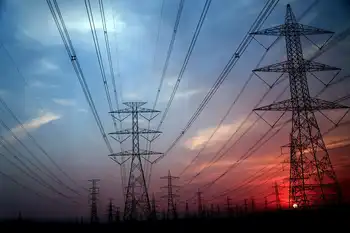Hydro-Quebec leaves industry association over disagreements on Kyoto treaty credits
MONTREAL, QUEBEC - Hydro-Quebec has pulled out of the national electricity industry association in a disagreement over the Kyoto climate change treaty, reflecting the deep divisions and confusion across the industry over how to implement the accord.
The rupture also pits producers of so-called "clean" renewable energy - such as hydroelectric utilities like Hydro-Québec - against electricity companies that use so-called "dirty" energy like coal, such as TransAlta Corp. of Calgary.
"We don't know where we're going" in terms of implementing Kyoto, said Michel Bourbonnière, manager of environmental performance issues at Hydro-Québec, Canada's biggest electric utility.
Hydro-Québec quit the Ottawa-based Canadian Electricity Association in January after deciding that the Quebec utility wasn't making sufficient progress in being fully recognized for its role as a producer of clean energy, Mr. Bourbonnière said in an interview.
"It's a matter of principle," he said.
Terms of the Kyoto accord call for the granting of so-called "emissions permits" to companies and utilities that pollute. The permits can then be traded on the open market, allowing plants that fall below their output ceiling to sell the resulting "credits" to those that exceed their allowances. However, so far there appears to be no impetus to allow for utilities like Hydro-Québec to participate in such a market through the allocation of permits to producers of "clean," renewable energy such as hydroelectricity and wind power, Mr. Bourbonnière said.
"We don't see eye-to-eye with the thermal, fossil fuel producers" such as non-regulated electricity giant TransAlta, he said. But he pointed out that Hydro-Québec remains on good terms with them and informal discussions continue.
He said Hydro-Québec has backing on the issue from other big hydroelectric producers, namely British Columbia Hydro and Power Authority, Manitoba Hydro and Newfoundland and Labrador Hydro-Electric Corp.
Ontario Power Generation Inc. (OPG) - which produces a mix of hydroelectric, nuclear and fossil fuel power - appears to be sitting on the fence on the issue, he added.
Glenn Schneider, spokesman for Manitoba Hydro, said Hydro-Québec's departure is "a disappointment. We thought there was a good benefit flowing to both parties - Hydro-Québec and the CEA - and they'll be missed. We were aware they were maybe suggesting their interests and concerns were not foremost on the CEA agenda."
Spokesmen for OPG and B.C. Hydro said that they don't comment on the decisions of other utilities. Officials at TransAlta did not return calls. TransAlta was holding a "family day," a provincial holiday in Alberta. The decision is certain to further weaken the association's lobbying clout in Ottawa, said Aldyen Donnelly of Vancouver's Greenhouse Emissions Management Consortium. "In terms of the effectiveness of the CEA, this will create some obstacles for them to overcome, especially as many of the members had - for a number of years now - not been fully co-operating with each other," she said. The CEA may also find it difficult to maintain operations, given the hit to their revenues Hydro-Québec's departure represents, she said.
Ottawa has yet to decide exactly who will do what to meet Canada's goal of reducing greenhouse gases by 2012 to 6 per cent below 1990 levels. Several measures related to Kyoto are expected to be outlined in the coming weeks.
Francis Bradley, spokesman for the Canadian Electricity Association, confirmed Hydro-Québec has left the lobby group, but said no one else has joined them in walking out the door. The CEA represents about 30 Canadian electric utilities, which account for about 95 per cent of the country's generating capacity.
"The reality is that, in an association such as ours, there are disputes among the members," Mr. Bradley said. "We're hopeful they'll be back in the fold."
One source who is close to recent events at the CEA said there were talks over "the issue of clean energy and whether (hydroelectric producers) should get clean energy credits.
" One issue that was never agreed upon was how aggressive Ottawa should be in rewarding "clean" energy producers, the source said. The problem is that with only a fixed number of credits allowed per country, less credits left over to be distributed to the thermal energy producers, the source said.
"Maybe Hydro-Québec felt [the CEA] weren't as aggressive as they could have been" on the issue, the source said.
In the years leading up to adoption of the Kyoto Protocol, Hydro-Québec president and chief executive officer André Caillé repeatedly criticized what he saw as a federal plan that emphasized alleviating the burden on polluters rather than helping existing "clean" and renewable energy sources via incentives.
Hydro-Québec has recently become increasingly involved in the development of alternative energy sources, with an ambitious investment program, for example, in privately owned wind power in the province. (TransAlta is also dabbling in alternative energy.) But not everyone agrees that hydroelectric power is perfectly clean and environmentally friendly. New York State - a major Hydro-Québec customer - has moved recently to ramp up the use of so-called "low-impact" renewable energy sources (biomass, wind power) to the exclusion of electricity from "high-impact" hydro dams.
Related News

"Knowledge Gap" Is Contributing To On-the-job Electrical Injuries
VANCOUVER - A BC Hydro report finds serious electrical contact incidents are more common among trades workers, and research shows this is partly due to a knowledge gap.
Trade workers were involved in more than 60 per cent of electric contact incidents that led to serious injuries over the last three years, according to BC Hydro.
One-in-five trade workers have also either made contact or had a close call with electric equipment.
“New research finds many have had a close call with electricity on the job or have witnessed unsafe work near overhead lines or electrical equipment,” BC Hydro staff…




